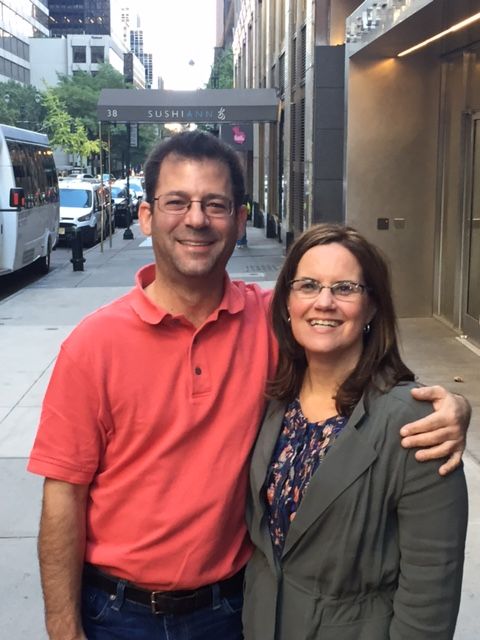December 18, 2020
What to Expect When You’re Not Expecting This

Written by Lisa Lenrow
There is no “What to Expect” bestseller that prepares you for the challenges of caring for a loved one who is ill. I did my very best looking after my husband, Jon, following his brain cancer diagnosis. In addition to being in shock and having my life upended, I knew that I had to be strong for my husband because there were going to be many things that he would not be able to do for himself that would fall on me. I think we got through the ups and downs by applying some of my professional skills to my new role. Spending my career in project management came in very handy in juggling Jon’s daily schedule.
For me, organization helps me deal with stressful situations. The best purchase I made was a whiteboard that still hangs in our kitchen. I listed all activities including my work schedule, family events, and all of Jon’s medical appointments. As Jon’s memory was affected, this allowed him to understand our schedule and helped me coordinate errands based on our appointments.
However, if organization isn’t your strength, call upon a friend or neighbor to help. It was initially uncomfortable but asking for and accepting help from friends was a huge weight off my shoulders. I greatly appreciated when they visited Jon, allowing me to step away. And their homemade meals were not only delicious, but also easy to heat and serve, making cooking one less chore.
Outsourcing some household tasks was necessary too. Because Jon’s daily radiation occurred during the winter months of 2018-19, I had to come up with a plan if there was bad weather. Under normal circumstances Jon would operate the snow blower; it was time to hire a company to plow our driveway. I alerted them of our morning schedule to ensure our house was the first one treated after a storm. Both the weather and service cooperated, and we never missed an appointment.
To continue my reduction of unnecessary stresses, I allowed extra time to get places and packed lunch and snacks. We arrived, relaxed, shared our snacks, and generally tried to spread positivity. While fulltime caregiving, I still had the responsibility of working, and often I had to multi-task. While Jon was getting chemo or physical, occupational or speech therapy, I got to know the nursing staff who shared network passwords and allowed me to work at their stations.
Fashion needed to meet utility in my new lifestyle. For Hanukkah I asked my mother-in-law for a stylish backpack. This eliminated the burdensome combination of a tote bag, purse, and lunch box. I was unencumbered; I had my hands free to haul Jon’s walker, wheelchair, or keep a tight hold onto my husband.
Jon’s brain tumor diagnosis turned our world upside down. By far, the best way that I could deal with it was to proactively organize our life and his medical appointments. By not wasting time running around in circles, we were able to spend precious time together, away from the disease.